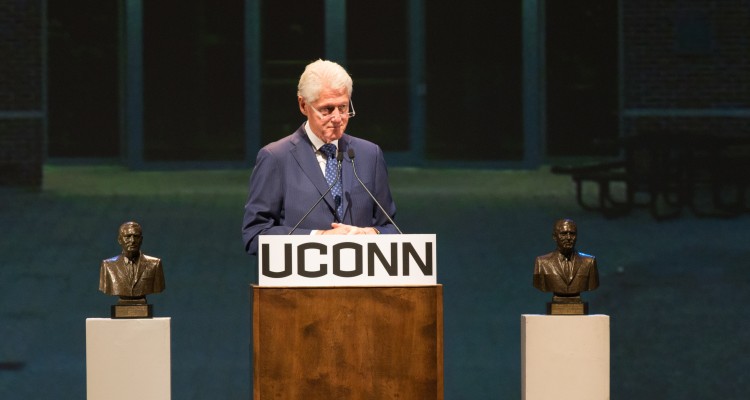Listen to the story below.
Audio Player
As the crowd filed into the Jorgensen Center for the Performing Arts Thursday evening, UConn students were talking about the opportunity to hear President Bill Clinton speak.
The seventh biennial Thomas J. Dodd Prize in International Justice and Human Rights was awarded to President Clinton and Tostan, an international human rights organization that promotes literacy and community engagement in primarily rural regions in West Africa.
As President Clinton took the stage to a standing ovation, he spoke to the big picture of human rights, looking towards a highly interconnected future.
“Human rights is even more important because we have got to find a way to share the future on positive terms, otherwise we are going to share it on negative terms.”
Clinton said Tostan has been an active part of the Clinton Global Initiative since 2007. The two organizations have worked together on Tostan’s Community Empowerment Program, as well projects to end the practices of female genital cutting and child marriage. In a nod to the organization he said,“I think it is the empowerment of people to take care of themselves is sometimes the most important right you can grant.”
Tostan’s work in Senegal and West Africa has been driven by the needs and values of the local community. Molly Melching, the founder and Chief Executive Officer of Tostan stressed the importance of understanding local values to effectively make gains in human rights.
“Because I spoke Wolof,” Melching said, “I quickly learned about the values that mattered so much to people. Values such as djam, bok, mbulo, jamm, munyo yar. Family, peace and well being, unity, patience, and above all respect.”
Tostan’s success has come from it’s innovative approach, called the Community Empowerment Program.
“The goal of the program was to create a model, of working with communities in which they themselves were at the center, that started with them identifying their vision, their goals, and their priorities for the future.”
Melching pointed out many success stories.
“I was recently on a visit in Southeastern Senegal, and to my great surprise found that in 55 communities where we were working, 63 Tostan participants had been elected to rural council and to the mayor’s office, and 41 of those were women.”
In closing, Melching offered a quote from diplomat, politician, and activist Eleanor Roosevelt,
“‘Where, after all, do human rights begin? In small places, close to home, so close, and so small that they cannot be seen on any maps of the world. Unless these rights have meaning there, they cannot have meaning anywhere.’”


